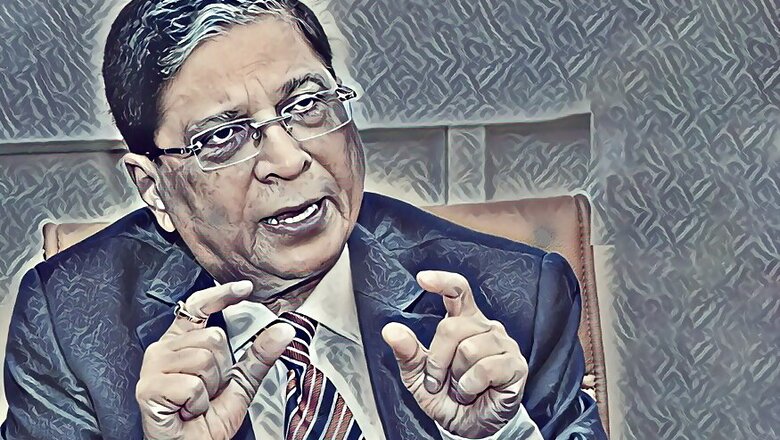
views
"Atrocious" is how the Chief Justice of India has now described the conduct of some senior lawyers in the last few days.
Apparently disturbed by the recurrence of such incidents in his court hall, CJI Dipak Misra, on Thursday, reproached the misdemeanor by a few designated senior counsels, and observed that shouting would suggest that the counsel don't have the ability to argue in law.
The CJI went on to issue a warning of sorts when he said that the judges will be constrained to act if the bar council fails to do something about it.
It is the presiding officer of a court who is the master of his court room and therefore, a duty is cast upon the judges to ward off even the slightest deviation from judicial demureness in the court proceedings.
The CJI, being the first among the equals in the top court, has done well to spell out his mind, and he would do better in the interest of the institution to make certain what happened in the recent past does not get repeated.
But how did the situation reach to this point?
Before Justice Misra took over the reins in August this year, his bench was adjudicating several matters pertaining to medical colleges and admissions. These matters, however, were not released from his bench even after he became the CJI. On the first Monday after Justice Misra came to court room number 1, his roster had more than 100 cases listed.
Days to follow witnessed the same din and pandemonium in court hall number 1. It was difficult to get inside the court room or come out as lawyers crammed the hall, waiting for their matters to be called out in the long list of daily cases.
Many senior lawyers, including women, complained about the commotion as some of them failed to reach to the front when their case was called out, while some of them could not hear the terms of the order.
A week later, when the CJI-led bench was hearing a case filed by a bunch of aggrieved home buyers of Jaypee Group, various lawyers, including Attorney General K K Venugopal, appeared in this matter.
And there it was, the first warning by no less than the top law officer.
While several lawyers engaged in a verbal duel among themselves, Venugopal told the CJI: "I have practised in this court for 50 years but I have never seen six senior lawyers arguing at the same time in the first court of this country and no one is able to make out anything. I have never seen the first court like this."
But this state of affairs continued. Since September 30 happens to be the court-mandated deadline for medical admissions, the clangour persisted along with the long cause lists.
In September, another extraordinary incident happened outside the Court. A retired high court judge was arrested by the CBI on charges of fixing the outcome of a medical college case, reportedly pending in the apex court.
Two PILs were subsequently filed in the Supreme Court, demanding a court-monitored probe by a special investigation team since judges of constitutional courts could be questioned as well.
Both the PILs stand dismissed on this day but the process of adjudication consisted of a high-voltage drama inside court room number 1 as Justice Misra presided over a Constitution Bench.
Last month, when one of these cases was being heard, lawyers from both the sides were seen shouting at the top of their voices, and levelling personal allegations against each other. The counsel for the petitioner even walked out of the court room after complaining that the Bench did not let him argue the case at all while every other counsel, although not connected with the PIL, was called out by the judges on the Bench to speak about general issues. By December 1, both the PILs had been dismissed with the latter one fetching a penalty of Rs 25 lakh against the petitioner NGO.
Just a few days later, on December 5, the high-profile Ramjanmabhoomi-Babri Masjid land dispute case was taken up by a special bench, headed by the CJI. An unprecedented drama unfolded in the next 100 minutes of hearing.
One senior lawyer submitted that Justice Misra should not start hearing the case since he won't be able to finish it by the time of his retirement -- October 3.
Another senior counsel from the same side said that the CJI must defer the hearing after 2019 general elections since the outcome of this sensitive case will impact the political fortune in the country. This lawyer in fact cautioned the CJI against “falling in a trap”.
Then a third argument was made that a seven-judge bench should hear this case because of the issues relating to right to worship in a mosque.
When the CJI asked these lawyers to explain on the points of law as to why a title dispute should be referred to a larger bench, three senior advocates said they don't need to argue on this aspect for the time being and that the CJI should show no haste in hearing this case. One of them even said he would alone need four to five months to prepare and read out his case.
Reminding the lawyers about their assurances that the final hearing in the case would begin from December 5, the CJI requested a senior lawyer to start by telling the facts of the case but even that was not acceptable to the other side, comprising the three senior lawyers. They threatened to boycott the proceedings and walk out if the final hearing began. The bench eventually adjourned the case.
On the very next, one of these three lawyers happened to be a counsel in another matter before the CJI-led bench. The lawyer’s attitude remained the same. Although the CJI and other judges on the bench kept requesting him not to argue the points already dealt with by other advocates from his side, he insisted he would make submissions in his own fashion. Not just this, despite being repeatedly asked, the lawyer refused to give written submissions instead of oral arguments.
It was in this background that on Thursday, senior advocate Gopal Subramanium regretted the recent occurrences in the court room, prompting the CJI to express his strong displeasure.
Justice Misra said that the events in his court in the last two days were “atrocious” and that he would not tolerate it any cost, come what may.
The warning has indeed come late but it is better late than never. Shouting and high-pitched arguments by the lawyers have been unprecedented in the first court of the country where decorum and discipline have always assumed utmost importance.
One would recall how the previous CJIs have handled situations while ticking off the “shouting brigade” in the Supreme Court.
One of these lawyers had in fact walked out of the court room after a former CJI declined to entertain a request for an adjournment without a good reason. A CJI, as he then was, had also warned another lawyer from this “group” – as has now been described by Justice Misra, against trying to browbeat judges by raising the voice.
One senior advocate had to furnish an unconditional apology in writing before a CJI for levelling scandalous accusations against the judges while an advocate-on-record was suspended for a month after he yelled that the court registry had “manipulated” dates of hearing.
Thus, all the previous chief justices have at every fitting occasion asserted the paramountcy of decorousness and propriety in the highest court of the land. Justice Misra has also now adequately indicated that his accommodative outlook cannot be construed as a sign of letting lawyers have a free run.
The Supreme Court of India is the place of not just aspiration but also of reverence for lawyers and litigants alike. Unruly scenes inside court rooms will only bring down the reputation of the institution, besides sending a wrong message to the subordinate courts, which place the Supreme Court at the highest pedestal of judicial discipline.
Sanctity and propriety of the court proceedings must be maintained and the CJI should lead by example by setting the record straight that unbecoming conduct of a lawyer, irrespective of his or her standing in the bar, fame or designation, will not be tolerated since it is the institution’s glory and status that matter the most.




















Comments
0 comment